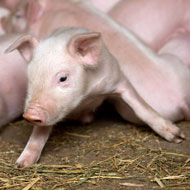MRSA found in pigs in eastern England

The UK's first known case of MRSA in pigs was reported in Northern Ireland last year.
Livestock-associated MRSA has been detected in pigs on a farm in eastern England, it has been confirmed.
The UK's first known case of MRSA in pigs was reported in Northern Ireland last year. Now, a further case on a breeder-finisher farm has been confirmed by the APHA.
The news was published in the latest Veterinary Record (Vol 176 No 6), in a letter written by Simon Hall from the APHA, Angela Kearns from Public Health England and Suzanne Eckford from the Veterinary Medicines Directorate.
According to the letter, a total of 11 litters on the breeder-finisher farm had skin disease. Out of 60 affected piglets, six died. Two of the 10-day-old piglets were submitted to an APHA veterinary investigation centre for testing on December 30, 2014.
Both piglets, which had been euthanised, had mutifocal skin lesions ranging from 2mm to 20mm in size. Skin and lung cultures found "profuse growths" of Staphylococcus aureus and further PCR testing confirmed the isolates as MRSA.
The genome of the MRSA isolate from one of the pigs was sequenced and found to be spa-type t034, multi locus sequence type ST398. The isolate was also found to be resistant to cefoxitin, penicillin, amoxicillan, tetracyclines and lincomycin.
Clinical signs in the herd resolved, according to the Vet Record letter - possibly due to attention paid to the underlying factors that may have caused minor skin trauma or influenced the level of environmental challenge.
ST398 has been confirmed in pigs and other animals in many countries in continental Europe, though it rarely causes disease in pigs. It is widely accepted that the use of antibiotics can create selective pressure, however the Vet Record letter points out that LA-MRSA has been found in animals that have never received antibiotics.
ST398 LA-MRSA is spread by direct contact with affected animals or humans, and contact with contaminated dust or other fomites. Those in close contact with affected livestock, including farm staff, are at greater risk of LA-MRSA. However, type ST398 does not show a greater tendency to cause human infection or spread from person-to-person.
Since a survey in 2008 found no MRSA-positive samples in the UK, ST398 has been detected on three occasions (including the latest case in eastern England). According to the letter to Vet Record, in the latest case, the isolate differs from those in the previous cases, which suggests "multiple incursions of ST398 LA-MRSA into the UK from different sources".
There is no legal requirement for animals and people to be screened when entering the UK from countries where infection is prevalent in livestock populations. However, the National Pig Association advises that all live pigs are screened before importation.
Writing in Vet Record, Simon Hall and co-authors advise livestock keepers to practice good biosecurity, hygiene and husbandry, and to adhere to responsible use of antibiotics.
Those in regular contact with LA-MRSA positive livestock are urged to observe good hygiene practices including washing hands thoroughly after handling animals, covering open cuts and wounds, and informing healthcare providers of the occupational exposure to livestock if undergoing medical treatment or elective surgery.



 The Veterinary Medicines Directorate (VMD) is inviting applications from veterinary students to attend a one-week extramural studies (EMS) placement in July 2026.
The Veterinary Medicines Directorate (VMD) is inviting applications from veterinary students to attend a one-week extramural studies (EMS) placement in July 2026.